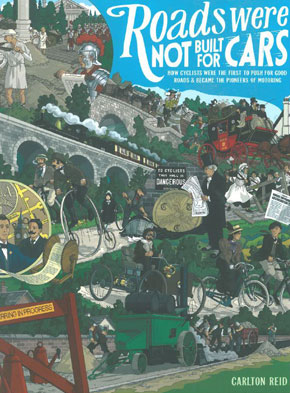
In 1887 Karl Kron published Thousand Miles on a Bicycle thanks to book pledges made by fellow cyclists as he pedalled his penny farthing around America. In 2013, Carlton Reid used crowdfunding website Kickstarter to fund the writing of Roads Were Not Built For Cars – a fascinating account of how cyclists were the first to push for good roads and became the pioneers of motoring.
Win your own copy
To win a paperback copy of the book, worth £20, simply leave a comment below and we will pick a winner next week.
| “despaired and neglected roads”
How many miles of road would you guess crisscross this little island of ours? 100,000? 200,000? According to the Department for Transport there are 245,000 miles of roads in Britain; a distance equivalent to circumnavigating the earth 10 times.
Even more surprising than the size of our road network is the relatively tiny proportion of it that was designed and built for cars and lorries; for every one mile of motorway, there are 95 miles of roads conceived originally for non-motorised traffic.
After the railway killed off stage-coach traffic in the 1830s, it was another 50 years before cyclists took to the roads and pushed for high-quality sealed surfaces and were the first to lobby for national funding and leadership for roads.
Rees Jeffreys might have been an early advocate for motorways, but he started his career campaigning on behalf of cyclists for the improvement of what he referred to as “despaired and neglected roads”, lobbying for the of spreading tar on Britain’s roads long before cars became a form of mass transport.
The bicycle is not only entwined with the earliest days of the motor car, it literally paved the way for its widespread uptake. Cyclists were to be written out of highway history in the 1920s and 1930s by the all-powerful motor lobby but even the venerable Automobile Association had been formed by a group that broke away from the Cyclists Touring Club.
This fascinating period in history from 1880-1905, which witnessed the first cycling boom and the start of our global obsession with motoring is explored in a gratifying degree of detail. The book brings the history of our roads up to date by delving into the psychology of road users today. The following extract is from one of a number of sample pages available to view here
Social scientists theorise that humans believe in three kinds of territorial space. One is personal territory, like home. The second involves space that is only temporarily available, such as a gym locker. The third kind is public territory, such as roads.
“Territoriality is hard-wired into our ancestors,” believes Paul Bell, co-author of a study on road rage. “Animals are territorial because it had survival value. If you could keep others away from your hunting groups, you had more game to spear, it becomes part of the biology.”
When they are on the road, some motorists forget they are in public territory because the cues surrounding them – personal music, fluffy dice, protective shells – suggest they are in private space.
“If you are in a vehicle that you identify as primary territory, you would defend that against other people whom you perceive as being disrespectful of your space,” added Bell. “What you ignore is that you are on a public roadway – and you don’t own the road.”
Ethical cycle insurance
On the face of it, one cycle insurance policy is much like another, but the excess you are charged in the event of a claim is just one of the things that varies wildly between providers. Another is so called ‘new-for-old’ replacement – many insurers use this term, but if your bicycle is more than a few years old, devalue it severely. This means you are left out of pocket when you come to replace it.
ETA cycle insurance has a low standard excess and offers a new-for-old for life – however old the bike, if it’s stolen you get enough to buy a new model. Furthermore, every cycle insurance policy you buy from us helps support the work of the ETA Trust, our charity campaigning for a cleaner, safer transport future – just one of the reasons The Good Shopping Guide has voted us Britain’s most ethical insurance company.

Steve K
and some cars are definitely not built for the roads …
Julia
We have much to be grateful for in the humble bicycle.
Martin G
Time to get serious about the bicycle and it’s role in *transport* in the UK. Time to stop dismissing cycling as a sport/leisure activity, and to reconfigure our streets to enable people to safely bike from A to B again.
L Woodman
An important book
Caroline Homfray
I suspected this was the case and am glad to have some published, authoritative back-up when faced by folks who think bikes are in the way.
Alastair Seagroatt
The partial polarisation of drivers and cyclists is quite sad. Any way of learning how to help combat this would be useful. I feel railing against motorists is counter productive and makes for entrenched views that may be hard to shift.
Anna Green
I’be been meaning to read this since publication!
Richard Scrase
We certainly need more roads just for bicycles, walkers, skaters …
Chris Bromwich
We need more peddle power on the roads!
Gavin
I’d love a copy of this book… tried to get the original, in hardback, when it came out – it sold out in a matter of hours!
wesley
Sounds like an interesting historical journey.
John W Davidson
Would love a copy of this book. Bikes are good for your health. They even help those with Parkinson’s disease.
Andy Brown
Maybe the Revolution will not be motorwayised. .
Ema
It seems like a good book; more roads for bicycles that do not pollute the environment 🙂
Cleatclicker
I was told to slow down when meeting a car on a narrow road yesterday.
Toity
Maybe all car drivers should be made to cycle on a main road before they take their test!?